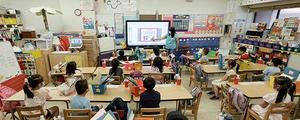Story Highlights
- Students with role models are more than 10 times as likely to show interest
- 53% of U.S. students say they have computer science role model
- Girls, rural, and Black students least likely to have such role models
Editor's Note: The research below was conducted in partnership between Amazon and Gallup.
WASHINGTON, D.C. -- Newly released research conducted by Gallup, in partnership with Amazon Future Engineer, confirms long-held anecdotal and qualitative evidence that role models are important to inspiring serious student interest in a computer science career. The study finds that U.S. students in grades five through 12 who strongly agree that they have a role model in computer science are more than 10 times as likely as those who strongly disagree to say they plan to pursue such a career -- 73% vs. 7%, respectively.
Students' interest in computer science, confidence that they can be good at it, and plans to engage with it in college and beyond are all strongly related to the presence of role models in their lives. Eighty percent of those who strongly or somewhat agree that they have a computer science role model are interested in learning about the topic, versus 43% of those who strongly or somewhat disagree.
| Yes, interested | No, not interested | |
|---|---|---|
| % | % | |
| Students who agree that they have a role model in computer science | 80 | 20 |
| Students who disagree that they have a role model in computer science | 43 | 57 |
| Amazon Future Engineer/Gallup Student Study, 2021 | ||
These relationships between role models and computer science aspirations are consistent among students in each gender, race/ethnicity and household income group.
Slim Majority of Students Agree That They Have Computer Science Role Models
The June 2-20, 2021, study of more than 4,000 fifth through 12th grade students finds 53% of U.S. students agreeing that they have role models in the computer science field.
| Strongly agree | 26% |
|---|---|
| Somewhat agree | 27% |
| Somewhat disagree | 21% |
| Strongly disagree | 26% |
| Amazon Future Engineer/Gallup Student Study, 2021 |
Sixty-one percent of those who have taken a computer science class at school say they have role models in that field, compared with 45% who have not taken a class.
These findings are among more detailed insights available in the full report.
Fewer Girls, Rural or Black Students Have Computer Science Role Models
However, traditionally underserved populations, including rural students, Black students and girls, are less likely than their counterparts to report they have role models in computer science.
The greatest differences are among rural students as compared with urban students. Just 15% of students living in rural areas strongly agree that they have computer science role models, compared with 46% of those living in large cities. This gap in access to role models is likely related to the corresponding difference in access to computer science classes, which are less common in rural schools, because teachers often act as these role models.
| Strongly agree | Somewhat agree | Somewhat disagree | Strongly disagree | |
|---|---|---|---|---|
| % | % | % | % | |
| Large cities | 46 | 26 | 13 | 14 |
| Suburbs | 19 | 31 | 22 | 28 |
| Small towns | 14 | 25 | 28 | 33 |
| Rural areas | 15 | 21 | 26 | 38 |
| Amazon Future Engineer/Gallup Student Study, 2021 | ||||
Asian and White students are more likely than Hispanic students to strongly agree that they have computer science role models, and Black students are the least likely. Boys are 10 percentage points more likely than girls to report that they have such role models.
| Strongly agree | Somewhat agree | Somewhat disagree | Strongly disagree | |
|---|---|---|---|---|
| % | % | % | % | |
| White students | 29 | 28 | 19 | 23 |
| Black students | 17 | 28 | 21 | 33 |
| Hispanic students | 23 | 26 | 23 | 28 |
| Asian students | 35 | 24 | 25 | 16 |
| Male students | 31 | 27 | 20 | 22 |
| Female students | 21 | 28 | 22 | 29 |
| Amazon Future Engineer/Gallup Student Study, 2021 | ||||
Bottom Line
The Amazon Future Engineer/Gallup Student Study supports past research suggesting role models are important to inspiring students' interest in computer science. Role models provide a mirror in which students can see their current and future selves, as well as a window into the field that is crucial to helping them see the possibilities it can offer them.
Although the importance of a computer science role model is clear, there are inequities in access to one. These imbalances track closely with other differences in access to and participation in computer science in rural areas, for historically underrepresented and marginalized students, and girls. More work remains to be done to provide students a vision for a career and to help them understand the practical applications of this in-demand field that lacks diversity in its workforce.
Read the full report for more detailed findings about access to and interest in computer science. Learn more about the Amazon Future Engineer Program here.




